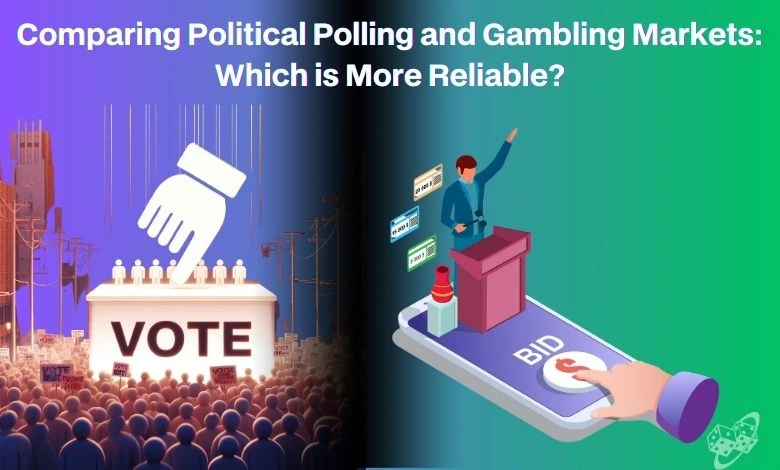
Comparing Political Polling and Gambling Markets: Which is More Reliable?
Gambling markets have attracted considerable attention in recent years, serving as an instrument for predicting elections. But are they more accurate than political polling? Comparing political polling and gambling markets is important to determine the effectiveness in predicting political outcomes. There is a conundrum regarding which tool can predict more accurately and whether one can be trusted more than the other. In this article, we will weigh the pros and cons of political polling and gambling markets to give our readers an overview of the two tools and help them in decision-making before they participate in the top election betting sites.

Table of Contents
How Does Political Polling Work?
Political polling can measure an entire country’s preferences by simply communicating with as few as a sample of 800 people, but only if they are selected randomly. Through polling, we can indirectly estimate the proportion through sampling.
There are other methods for political polling, such as surveys and margin of error. The margin of sampling error shows how close one can easily expect a survey outcome to fall compared to the true population value. Typically, a margin of error of plus-minus 3% at a 95% confidence level indicates that if the same survey is fielded 100 times, the results could be within 3% of the true population value 95% of those times.
However, there are other challenges with polling, which include sample sizing, biased questions, and interpretation of results, which can be corrected by using weighting. When weighting is performed correctly, based on given demographic factors such as gender, age, and race, it may not be as problematic as one may think.
How Do Political Gambling Markets Work?
Strengths and Weaknesses of Political Polling
- Strengths:
Political polling is best used to analyze what public sentiment is or how the general demographic feels or thinks about a particular political event. Instead of conducting elections, conducting political polling becomes an affordable option where a large part of public polling generally bases their opinion on historical facts relevant to the current topic. Even if the facts are false, understanding political polling can potentially get rid of errors. This is because the polls offer a public platform to view different aspects objectively.
Political polling also focuses on random interviews of the audience without giving them adequate time or information to think about. This offers a detailed insight into demographic breakdowns and cuts out various distracting questions or the pressure to justify themselves. Hence, the potential for accurate first-thought answers is always at the disposal of the public.
Weaknesses:
Considering the advantages of conducting political polling, there are a few disadvantages also, starting with the vulnerability to inaccuracies due to small sample sizing, timing, and non-response biases. There is also the possibility of getting a vague picture, which leaves scope and room for interpretation, which could eventually turn into misinterpretations, too.
There is an over-reliance on political models that may or may not consider the changes in public sentiment when a particular event takes shape in reality. Sometimes, real-time political polling can result in changes in a participant’s answer based on their access to the results. These cases call for major errors, and hence, political polling may not always be reflective of the true voter turnout.
Strengths and Weaknesses of Gambling Markets
- Strengths:
The gambling market is where players put their money on the predictions of various political events to earn higher returns. This reflects the financial stakes that they are willing to take by betting on political markets. The “Crowdsourcing” element tends to segregate and filter out the extremes in public opinion. Furthermore, many political betting strategies may hinge on fluctuating odds, some of which may work with short-term fluctuations while others depend on long-term odds variations. The political market-driven odds tend to be dynamic, quickly adjusting to various news, market sentiment, events, and even bookmakers’ strategies.
- Weaknesses:
Coming to the other side of the same coin, there are disadvantages of gambling markets. For starters, gambling or betting markets can easily be swayed by irrational or emotional bets. Moreover, some events may have limited participation than the other broad polls, thereby, the same volume of population may not influence an event. The outcome of an event may reflect what the participants think will happen for a particular event, not what they hope for. Hence, the predictions may not always give the right picture of what the bettors believe will happen during or at the end of the event, likewise, there are a lot of Political betting complexities to be understood before deciding on what or how to proceed.
Case Studies: Recent Elections
The recent elections for contestants Kamala Harris and Donald Trump project a nail-biting race. Based on political polling, the nominees fought fierce competition, but the betting markets indicated an entirely different story.
Based on reports by PredictIt, Donald Trump was ahead of the vice president with a chance of victory of 57.7%. Another betting platform, PredictIt, saw a major shift in public sentiment, with bettors backing the former US president by a margin of 54% to 49%.
Although recent polling indicates a close race compared to the betting markets, it also indicates a growing momentum behind Donald Trump’s campaign. The polling found the two contestants in a dead heat, with each gathering 48% support. This represented a major shift from the polling results, which showed Harris leading Trump by a margin of 49% to 44%.
Overall, experts in the betting markets find their results to be better than the polling results since they quickly adapt to current developments like breaking news and debates.
Which is More Reliable?
Gambling markets seem to be more victorious from an economic point of view, yielding more accurate probability than political polling for various events. It is difficult to draw a clear inference as to which method consistently outperforms. Participants in gambling markets are exposed to historical records, competitive betting odds, and more relevant information than polling respondents. Furthermore, gambling markets tend to aggregate opinions in the most unique way, where both optimistic and pessimistic opinions cross at a point, giving a clear picture to the bettors. All in all, gambling betting markets are not a recent invention as they have always been used as a useful tool for providing more accurate probabilities than political polling. Different players participate in political polling and gambling markets, which have raised inferential problems; perhaps a combination of the two or a method of aggregation can result in efficiency and accuracy in political betting.
Conclusion
While neither political polling nor the gambling market is perfect, polling has always been more prone to substantial errors. Betting markets are typically more likely to give accurate predictions. Betting odds reflect real-time public sentiment and are more capable of adapting to new developments, while political polling can lag or misinterpret public opinion due to sample sizing, non-response biases, and timing. That said, both political polling and gambling markets are best considered in tandem, providing valuable insights but having their own set of strengths and weaknesses. To maximize the chances of accurate prediction, we recommend combining insights from both tools alongside your own individual analysis. A balanced approach will help punters make well-informed decisions, which can potentially improve their chances of getting higher returns.
FAQs
Why do political poll results differ from political betting odds?
Political polls and betting odds are fundamentally different elements. While political polls focus on which candidates are most likely to win, political polls evaluate voters’ preferences for parties or candidates along with their opinions on related political issues.
Can Betting Markets Predict Election Results?
Yes, betting markets can predict election results, but to get stronger and more accurate predictions, we recommend using both betting markets and political polling.
How did Betting Sites predict the future of Election results?
Using AI-powered predictive modeling, betting markets can predict the future outcomes of election events with greater accuracy than any other tool.
How Accurate are Prediction Markets?
Using AI-powered predictive modeling, betting markets can predict the future outcomes of election events with greater accuracy than any other tool.









